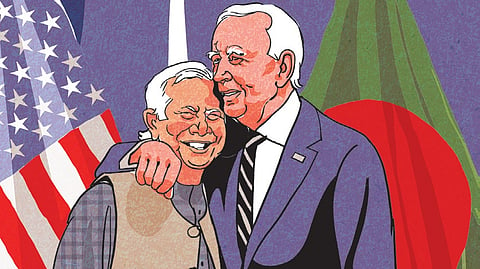Eyeing democracy through mob rule
Bangladesh is once again in the throes of violence that has almost become a precondition for regime change in the country. Mercifully, Sheikh Hasina has escaped alive, for even though assassinations are now less common, the mob attack on her residence could easily have degenerated into a massacre reminiscent of her father’s killing half a century ago.
Awami League supporters, particularly Hindus, and the police have been targeted, in what is being called a revolution for the restoration of democracy and human rights. The Chakmas of the Chittagong Hill Tracts have also been targeted. While there is speculation about a foreign hand, and some Indian observers are blaming the US ‘deep state’, Bangladeshis insist that it was a spontaneous student agitation against an authoritarian leader.
Whatever be the truth, the Jamaat-e-Islami and other radical Islamic elements that had been suppressed by Hasina are back in business. Khaleda Zia’s Bangladesh National Party (BNP) is demanding early elections, but her son, Tarique Rehman, remains in exile in London. For India, all this is very uncomfortable. It had invested heavily in Hasina’s Bangladesh and even made territorial concessions to resolve outstanding boundary issues. It had, for example, implemented the long-delayed exchange of enclaves in which it lost twice as much land as it gained. It also accepted the arbitral award on the maritime boundary even though it was unhappy about it.
Hasina responded in kind to India’s gestures and during her 15-year-rule India-Bangladesh relations flowered as never before. Several land, rail and river links were established leading to Indians enjoying transit facilities from Bengal to the northeast for the first time.
Bangladesh saw unprecedented economic growth as trade and investment from India increased. India became Bangladesh’s fourth-largest trading partner and its largest market in Asia. Bangladesh became India’s largest trading partner in South Asia. Its per capita income quadrupled and even overtook India’s in 2021 for a couple of years.
Hasina also took action against radical Islamic groups and long-pending judicial proceedings were successfully pursued against leaders who had collaborated in the genocide in 1971. In contrast, during Zia’s last term, Bangladesh had become a hotbed of Islamic fundamentalism and a safe haven for insurgents from India.
However, over time, Hasina came to be seen as an authoritarian ruler. In 2011, she scrapped the system of holding elections under a caretaker government headed by a retired chief justice. Three elections were held under this system with both parties participating. The BNP boycotted all the elections held afterwards and there were widespread allegations of election fraud.
The tasks before Muhammad Yunus are formidable—controlling law and order, improving the economy and holding elections. His start has not been auspicious. Many policemen have been disbanded and instances of mob justice are being reported. The crackdown on journalists and the Opposition mocks his claim of restoring democracy and human rights. More than 150 journalists are facing charges such as murder and crimes against humanity, drawing criticism from human rights groups abroad. The government has now banned political activity in university campuses, an ironic step considering it came to power riding on a student-led agitation.
Yunus’ biggest challenge will be stabilising the economy. In 2023, the IMF had approved a loan of $4.7 billion of which $2.3 billion has been released. Bangladesh has now sought a $3-billion relief. IMF’s conditionalities will not be popular and any slowdown in relations with India will hurt the economy further. India’s exports to Bangladesh slipped 28 per cent in August. Some of India’s exports like cotton are vital for Bangladesh’s garment exports.
Yunus’ political challenges are no less daunting. He is treating himself as a reformer, not a place holder. He wants to carry out major economic and political reforms before holding elections. All his three supporters—the army, the religious parties and the students—are with him, for now. The army does not wish to take power directly for fear of forfeiting the lucrative UN peacekeeping assignments. It is happy to keep him as its civilian face. The fundamentalist parties cannot hope to win an election on their own and are happy with the quasi-military arrangement. But this honeymoon period will not last long.
For India, the signals coming from Bangladesh are mixed. Teesta waters, border killings, reviving SAARC are all being chanted by the new leaders as evidence of India’s unwillingness to address Bangladesh’s concern. India should avoid making acrimonious tit-for-tat statements and respond positively to any friendly overtures from the new regime; but it should make it clear that Hasina will not be extradited against her wishes to face a witch-hunt back home.
Dilip Sinha
Author and Former Diplomat
dilipsinha@hotmail.com

